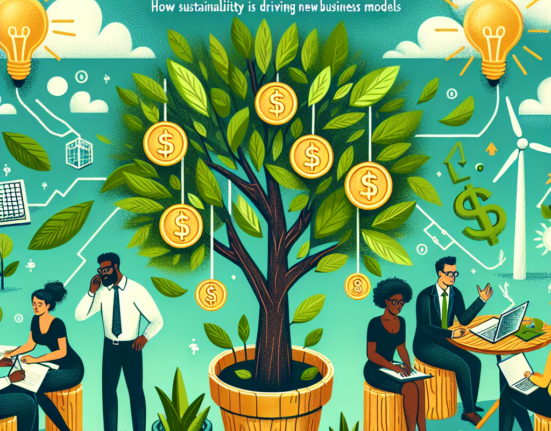Sustainability in Business: Profiting with Purpose
In today’s rapidly evolving global market, the concept of sustainability has transcended from a mere buzzword to a fundamental component of business strategy. Sustainability in business refers to the practice of operating in a manner that safeguards the environment, ensures social equity, and promotes long-term economic viability. Companies that embrace sustainability aim to meet the needs of the present without compromising the ability of future generations to meet their own needs. This shift towards sustainable business practices is increasingly driven by consumer demand, regulatory pressures, and the recognition that long-term profitability can coexist with, and even be enhanced by, a commitment to purpose.
Economic Advantages of Sustainability
Contrary to the outdated notion that sustainability comes at the expense of profitability, forward-thinking businesses are proving that it is possible to achieve both. Sustainable practices can lead to significant cost savings, innovation, and new market opportunities. For example, energy-efficient technologies and waste-reduction strategies can lower operating costs. In the realm of product development, the circular economy — where products are designed to be reused, refurbished, or recycled — opens avenues for innovation and resource efficiency.
Additionally, sustainable businesses can differentiate themselves in a crowded market. Consumers, especially millennials and Gen Z, are increasingly making purchasing decisions based on the ethical and environmental practices of companies. Brands that align with these values can foster loyalty, attract a more dedicated customer base, and command premium prices. Furthermore, sustainable companies often enjoy enhanced reputations, which can lead to stronger relationships with stakeholders, including investors, who are increasingly factoring environmental, social, and governance (ESG) criteria into their decisions.
Environmental Stewardship
Businesses play a critical role in addressing environmental challenges such as climate change, resource depletion, and pollution. By integrating sustainability into their core operations, companies can significantly reduce their environmental footprints. This includes adopting renewable energy sources, improving energy efficiency, implementing water-saving measures, and committing to zero-waste goals.
For example, multinational corporations like Apple and Google have made substantial investments in renewable energy. Both have achieved the milestone of having their operations powered by 100% renewable energy. Additionally, through initiatives such as the LEED (Leadership in Energy and Environmental Design) certification, companies can ensure that their buildings are resource-efficient, high-performing, and environmentally responsible.
Social Responsibility
Sustainable business practices extend beyond environmental considerations to encompass social responsibility. This includes fair labor practices, community engagement, inclusivity, and ethical governance. Companies need to ensure that their supply chains are free from human rights abuses and that working conditions are safe and equitable. Additionally, fostering a diverse and inclusive workplace can lead to varied perspectives, driving innovation and better decision-making.
One exemplary model is Patagonia, the outdoor clothing company. Patagonia’s commitment to environmental and social responsibility is reflected in its "1% for the Planet" initiative, where it donates 1% of its sales to environmental causes. The company also actively engages in auditing its supply chain to ensure ethical practices and promotes fair labor conditions worldwide.
The Role of Regulation and Policy
Government regulations and policies play a pivotal role in shaping sustainable business practices. Regulations such as carbon pricing, emissions standards, and renewable energy mandates create a level playing field and incentivize businesses to innovate in sustainability. Additionally, governments can support sustainable business through grants, tax incentives, and infrastructure investments.
The European Union’s Green Deal is a prime example of ambitious policy aimed at making Europe the first climate-neutral continent by 2050. This comprehensive plan includes investment in renewable energy, energy efficiency, and sustainable transportation, along with strict environmental standards that businesses must meet. By providing a clear regulatory framework, governments can help businesses transition to sustainable practices.
Challenges and the Path Forward
Despite the clear benefits, integrating sustainability into business operations comes with challenges. Initial investments in sustainable technologies and processes can be substantial, and quantifying the returns on such investments can be complex. Additionally, achieving sustainability goals requires cultural shifts within organizations, often necessitating reeducation and reprioritization.
However, these challenges are not insurmountable. Businesses can start by setting clear, achievable sustainability targets, and tracking progress through transparent reporting. Collaboration is also key; partnerships with non-profits, governments, and other businesses can amplify impact. Moreover, companies should communicate their sustainability efforts effectively to stakeholders, thus building trust and demonstrating long-term commitment.
Conclusion
The imperative for sustainability in business is clear. In embracing sustainability, companies are not only contributing to the resilience of the planet and society but are also positioning themselves for long-term success. By integrating sustainable practices, businesses can innovate, reduce costs, meet consumer demand, and build robust reputations. Ultimately, profiting with purpose is not just an ideal — it is a viable, necessary strategy for future success.
















Leave feedback about this
You must be logged in to post a comment.